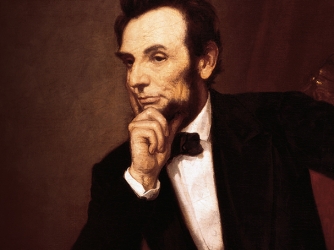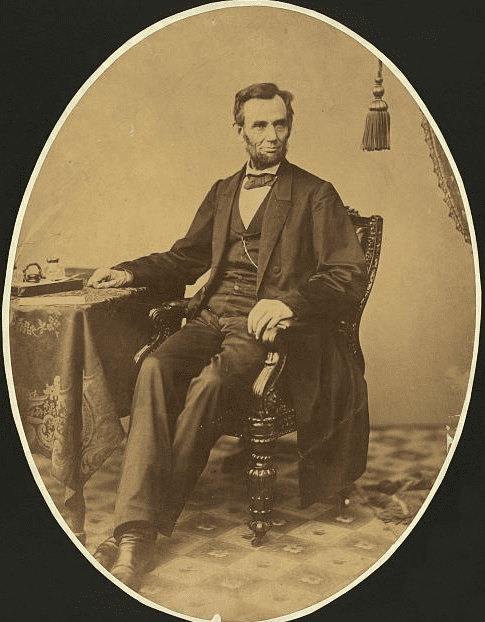My Role Model - Abraham Lincoln
As the 16th President of the United States, Abraham Lincoln represents the perfect role model for me and many of his deeds and actions throughout his career can be looked upon as a good example for lessons in life.

Image Source: Google Images
Brief Biography
Abraham Lincoln came from humble beginnings. He was born in
a single-room log cabin in Hardin County, Kentucky. His parents were Thomas and
Nancy Hanks Lincoln. His father lost everything when Abraham was young and they
had to move to Perry County, Indiana where they struggled to get by. When he
was just nine years old, his mother died and his sister Sarah took care of him
until his father remarried.
Abraham had very little formal education, but had a strong
interest in books and learning. Most of what he learned was self-educated and
from books he borrowed. His family later moved to Illinois where Lincoln would
set out on his own.
As a young man, Lincoln worked a variety of jobs including
shopkeeper, surveyor, and postmaster. For a time, he even split firewood with
an axe for a living. He soon moved into politics and won a seat in the Illinois
Legislature when he was 25.

Image Source: Google Images
Top Qualities
President Abraham Lincoln appointed the best and brightest
to his Cabinet, individuals who were also some of his greatest political
rivals. He demonstrated his leadership by pulling this group together into a
unique team that represented the greatest minds of his time, according to
historian Doris Kearns Goodwin.
1)Capacity to Listen to Different Points of View
While researching her Pulitzer Prize winning book, Team of
Rivals: The Political Genius of Abraham Lincoln, Kearns Goodwin learned that
Lincoln had the capacity to listen to different points of view. He created a
climate where Cabinet members were free to disagree without fear of
retaliation. At the same time, he knew when to stop the discussion and after
listening to the various opinions, make a final decision.
Image Source: Google Images
2)Ability to Learn on the Job
Lincoln was able to acknowledge errors, learn from them, and
then move. In this way, he established a culture of learning in his
administration, said Kearns Goodwin.
3)Ready Willingness to Share Credit for Success
In response to concerns expressed by friends about the
actions of some of his Cabinet members, Lincoln stated that the "path to
success and ambition is broad enough for two" said Kearns Goodwin. When
there was success, Lincoln shared the credit with all of those involved.
4)Ready Willingness to Share Blame for Failure
When mistakes were made by members of his Cabinet, Lincoln
stood up for them said Kearns Goodwin. When contracts related to the war effort
raised serious questions about a member of his administration, Lincoln spoke up
and indicated that he and his entire Cabinet were to blame.
5)Awareness of Own Weaknesses
Kearns Goodwin noted that one of the weaknesses acknowledged
by Lincoln was his tendency to give people too many chances and because he was
aware, he was able to compensate for that weakness. As an example, she stated
that George McClellan, Commander in Chief of the Union Army, refused to follow
directives about the war effort. Lincoln eventually set a deadline and
eventually removed McClellan from the position.
6)Ability to Control Emotions
According to Kearns Goodwin, Lincoln treated those he worked
with well. However, he did get angry and frustrated, so he found a way to
channel those emotions. He was known to sit down and write what he referred to
as a “hot letter” to the individual he was angry with and then he would set the
letter aside and not send it. If he did lose his temper, Lincoln would follow
up with a kind gesture or letter to let the individual know he was not holding
a grudge, said Kearns Goodwin. She noted that one of the letters was released
as part of Lincoln’s Presidential papers with a notation that it was never
signed nor sent.

Image Source: Google Images
7)Go Out into the Field and Manage Directly
During the Civil War, many soldiers died and there were many
ups and downs. Lincoln established lasting connections with the troops by
visiting the battlefield and hospitals, which also helped bolster morale.Lincoln also spent time talking with members of the public,
taking ‘public opinion baths’ according to Kearns Goodwin. He held public
receptions and made a point of shaking everyone’s hand and speaking to each
individual.
8)Strength to Adhere to Fundamental Goals
In the summer of 1864, said Kearns Goodwin, the war was not
going well for the North. Members of his political party came to Lincoln and
said that there was no way to win the war and he might need to compromise on
slavery. Lincoln held firm on the issue of slavery and turned away from this advice.
9)Ability to Communicate Goals and Vision
Kearns Goodwin stated that Lincoln had a “remarkable ability
to communicate his goals to his countrymen.” He made concepts simple and
communicated with an understanding of the concerns of the citizens.
When the war ended and he won reelection, Lincoln did not
focus on his achievements said Kearns Goodwin. Rather, in his second inaugural
speech, Lincoln focused on bringing the country together as expressed in the
following excerpt. “With malice toward none, with charity for all, let us
strive on to finish the work we are in, to bind up the nation’s wounds, to care
for him who shall have borne the battle and for his widow and his orphan, to do
all which may achieve and cherish a just and lasting peace among ourselves and
with all nations.”
All of the above qualtities clearly portrayed "Honest Abe's" qualities as not only a leader who was smart, but also has a touch of class, quality and retains the human elements such as compassion for other beings and the conscience to treat anyone of any ethnicity as an equal.



No comments:
Post a Comment